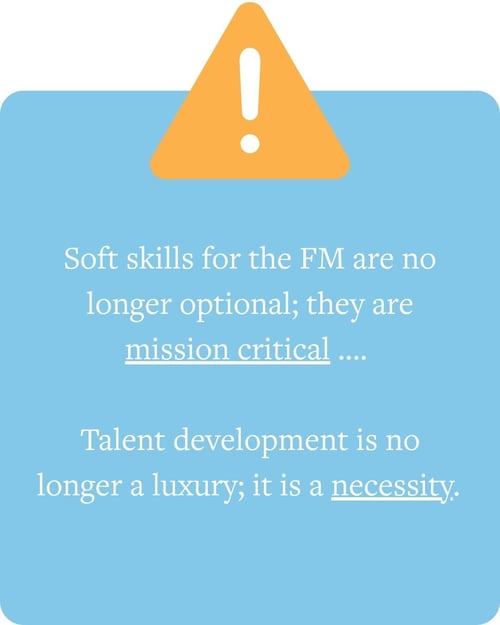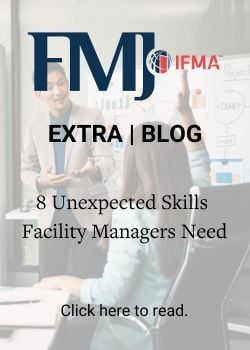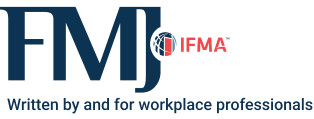Building the Future
Talent development in FM

The facility management sector is undergoing rapid transformation. FM has moved from the basement to the boardroom as it is now considered a strategic partner to organizations, rather than simply a cost line to be managed.
Coupling this with technological advances and increased sustainability initiatives, FM roles are quickly evolving beyond their traditional responsibilities. Success in this new era will depend not only on technical knowledge, but FMs must cultivate soft skills, a customer service mindset and a commitment to lifelong learning.
To stay competitive, FM leaders must invest in talent development – equipping their teams with the skills and mindset needed to thrive in an ever-changing environment.
 Evolving roles demand new skills
Evolving roles demand new skills
FM used to be simply about maintenance and building operations. Those days are long gone and today, FMs wear numerous hats: as strategic partners, sustainability advocates, data analysts and technology integrators. This shift demands a new kind of professional – one who is adaptable, emotionally intelligent and ready to lead.
Organizations that recognize this evolution are heavily investing in professional development, offering training in leadership, stakeholder engagement, communication and other soft skills, alongside traditional technical certifications.
Soft skills for the FM are no longer optional; they are mission critical. Emotional intelligence enables FM professionals to lead diverse teams, navigate complex stakeholder relationships, and foster inclusive workplace environments. Building leadership capacity and connectivity across all levels of the FM team ensures resilience, enhances decision-making and empowers teams to take proactive ownership of their work.
Fostering a culture of lifelong learning
Talent development cannot happen as a one-off or be resigned to a single training session. Leaders of FM teams should cultivate a culture of continuous learning to ensure development thrives. One where curiosity is encouraged, mistakes are viewed as learning opportunities and professional growth is a shared value.
To foster this culture, FM leaders should offer advanced, structured training opportunities in high-demand areas like sustainability, digital technology (especially AI) and leadership. Courses in energy management, smart building systems and digital analytics not only prepare teams for the future but also demonstrate the organization’s commitment to their long-term success.
Leaders should remember that most learning occurs through exposure. Therefore, cross-departmental collaboration or exposure to vendor partners and the work they should be a key strategy. By encouraging FM teams to work closely with trusted vendor partners as well as IT, HR, sustainability and finance departments, organizations can build versatile skill sets that cut across traditional silos. This not only increases operational agility but also nurtures well-rounded professionals who can see the bigger picture and innovate more effectively.
Emotional intelligence & leadership: The hidden differentiators
Traditionally, FM is considered a profession that demands a high level of technical acumen. With this in mind, it is tempting to focus talent development efforts purely on hard skills. However, in todays’ environment, emotional intelligence and leadership skills are just as important – if not more so.
FMs must lead diverse teams, manage high-pressure situations and navigate complex human dynamics daily. Training in emotional intelligence strengthens communication, empathy, and conflict resolution skills — qualities that drive better team performance and workplace satisfaction.
Leadership development programs, meanwhile, prepare individuals to take on more responsibility, advocate for innovation and lead organizational change. Investing in these areas signals to employees that their growth is valued and that leadership potential is recognized at every level. They can also help FMs to gain increased resilience – a key skill that must be honed to ensure they can face into any challenge with calmness and clarity.
 Celebrate achievements & set new goals
Celebrate achievements & set new goals
A key factor in ensuring ongoing talent development is about reward, recognition and clear goal setting. Celebrating team achievements consistently helps to build morale and reinforces the importance of learning and continuous improvement. Who doesn’t love a good celebration after working so hard?
As each new year approaches (financial or calendar), the ideal time arises to set individual and team development goals. Consider incremental, achievable goals, for example mastering a new software platform, obtaining a green building certification or leading a cross-functional project. Setting clear, meaningful goals clarifies and defines success and helps ensure professional growth is prioritized.
By connecting these goals to broader organizational strategies, FM leaders can create a powerful sense of purpose and momentum across their teams.
What’s next?
Talent development is no longer a luxury; it is a necessity for facilities management organizations aiming to lead in a rapidly changing world. By investing in soft skills, fostering continuous learning, promoting cross-departmental collaboration, and emphasizing emotional intelligence and leadership, FM leaders can future-proof their teams, and their organizations.
As the profession evolves, the most successful FM will not just maintain buildings; they will also drive transformation, innovation and sustainable growth.

Read more on Leadership & Strategy and Career Advancement or related topics Workforce Development and Staffing
Explore All FMJ Topics








